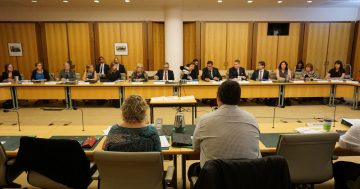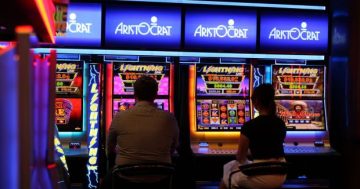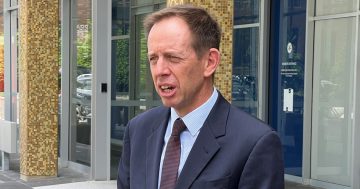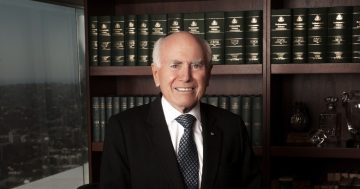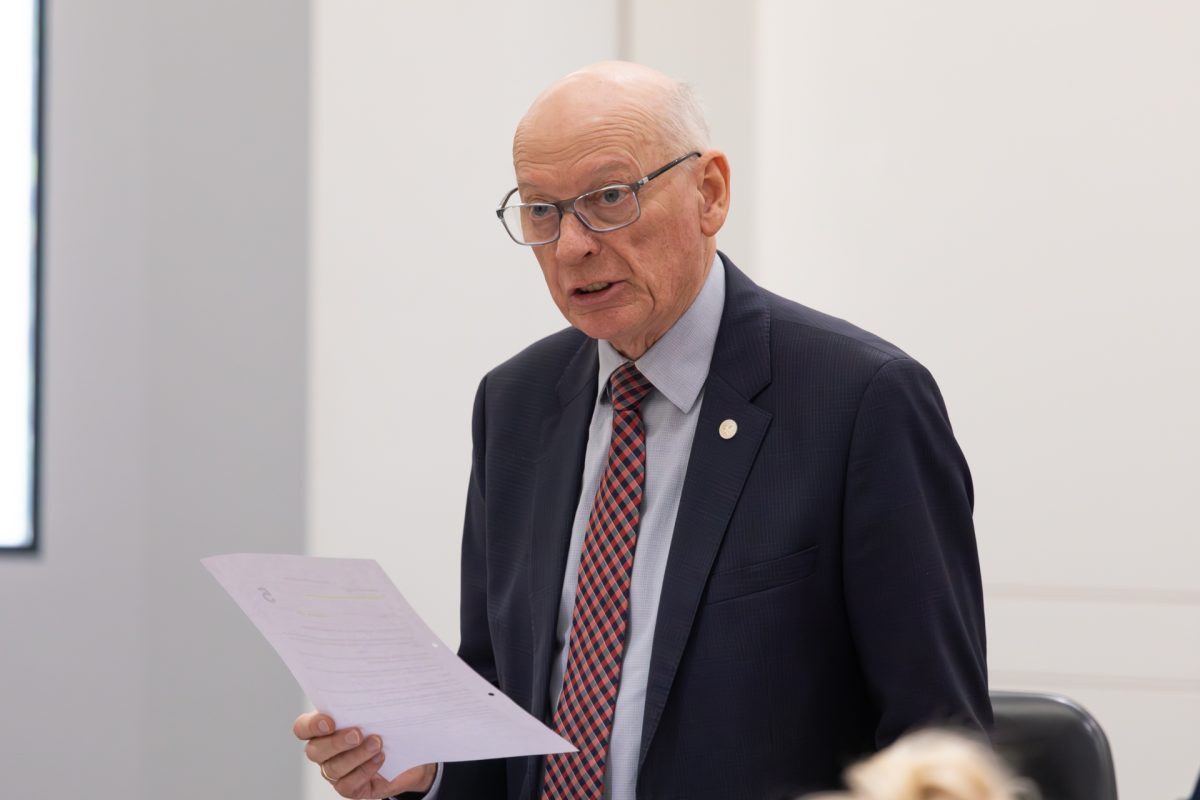
Chair of the inquiry Peter Cain from the Canberra Liberals recommended a trial of cashless gaming in his dissenting report. Photo: Michelle Kroll.
A Legislative Assembly committee inquiry into cashless gaming has not come up with any recommendations on the concept in a 45-page final report that has been criticised by both sides of the debate.
Cashless gaming is a system whereby gamblers are blocked from putting cash in poker machines and must instead use a card or digital wallet. It is aimed at preventing the machines from being used for money laundering and can also be used to curb problem gambling by setting limits on losses.
Clubs ACT CEO Craig Shannon called the report “a completely wasted opportunity”.
“None of the recommendations even use the term cashless gaming in them. They have very little to do with why the inquiry was set up,” Mr Shannon said.
Associate Professor Aino Suomi, director of the ANU’s Centre for Gambling Research, expressed a similar view.
“I thought it was interesting the recommendations don’t match the terms of reference or report content,” she said.
The report, handed to the Legislative Assembly last week, canvassed views both for and against cashless gaming and recommended the ACT Government “articulate a long-term vision for gambling harm reduction” and “continue to reduce the number of electronic gaming machines”.
“The recommendations had nothing to do with the substance of the inquiry and were designed to pedal a political perspective on gambling in the lead-up to the election,” Mr Shannon said.
“It is very difficult to get an intelligent conversation in this town about … proper regulation as it continually gets infected by ideological positioning in terms of gambling harm.”
In a dissenting report, Liberal MLA and inquiry chair Peter Cain recommended a cashless gaming trial be introduced in the ACT.
Alliance for Gambling Reform chief advocate Tim Costello said there is no need for a trial.
“The evidence is overwhelming that cashless gaming works,” Reverend Costello said.
“The 1999 Productivity Commission report recommended the introduction of mandatory cashless cards.
“Canberra always boasts about how progressive it is, but it’s still dragging its feet for 25 years on cashless gaming.
“ACT and NSW Labor have $120 million of assets in pokies clubs. It’s the most obvious and horrible conflict.”
In response, Minister for Gaming and Greens leader Shane Rattenbury said: “I agree with Mr Costello and the other experts on this issue. As I’ve said repeatedly, the ACT needs a cashless system that must be accompanied by best-practice player protections such as loss limits and underpinned by a central monitoring system to ensure the protections are universal and effective.
“I have this proposal developed and costed and before government for a decision, and I continue to prosecute it. The Labor Party, at this stage, is choosing to go in a different direction with its own alternative – and heavily criticised – gambling policy.”
The inquiry report said the ACT Government did not have a set policy to introduce cashless gaming in Canberra.
However, in a pre-election media statement issued on 12 June, ACT Labor pledged to introduce cashless gaming by 2026-27.
“Cashless gaming has been implemented in Tasmania by the Liberals, where Labor were embarrassed into supporting it. Tasmania set the gold standard. Their loss limit is $100 a day and $5000 a year. That enormously helps problem gambling,” Reverend Costello said.
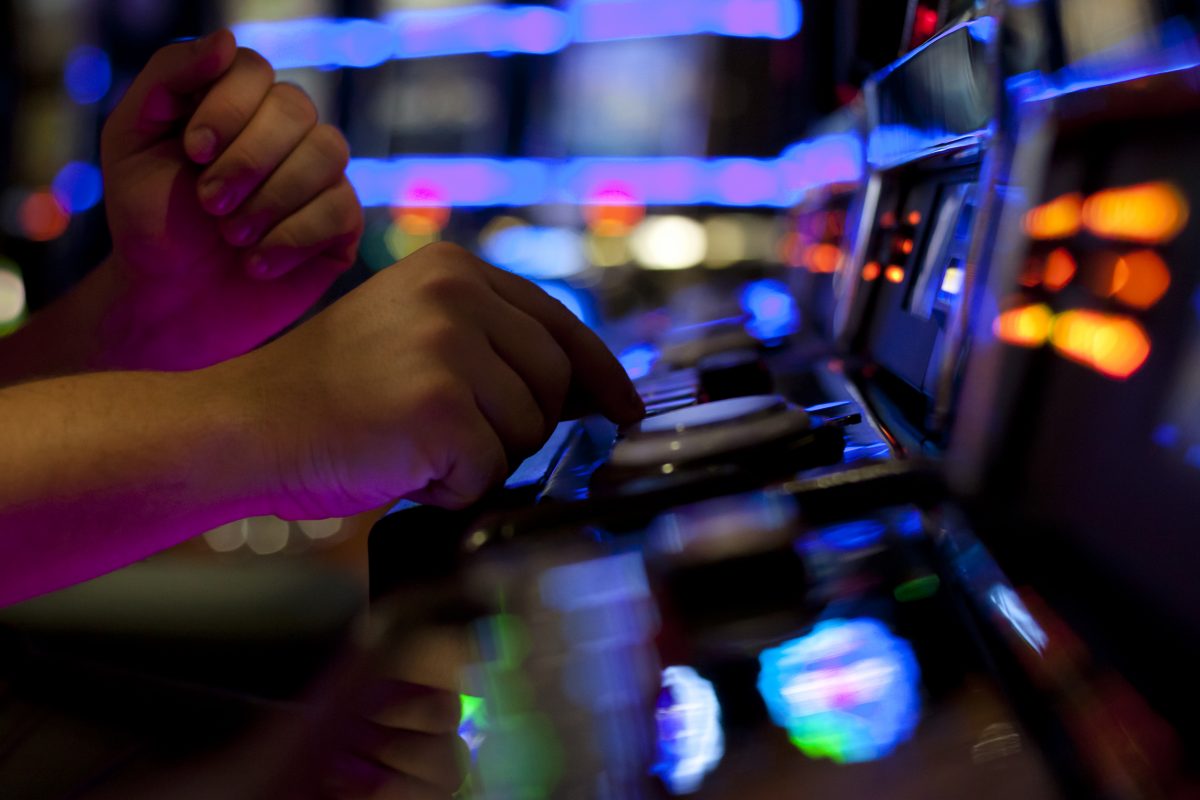
Cashless gaming still seems a long way off in the ACT. Photo: File.
Associate Professor Suomi said the Tasmanian spending limits should be the “bare minimum” for the ACT and wanted them even lower.
Clubs ACT CEO Craig Shannon challenged this view.
“They clutch their pearls and talk about Tasmania like it’s a God-delivered resolution to all these issues,” he said.
“The Tasmanian trial has not even started. There is no impact analysis available; it’s been deferred and delayed, and we understand it may be changed before it’s due to be implemented in December.”
Mr Shannon also said the priority for ACT was consistency with neighbouring NSW to ensure problems didn’t spill over the border.
“The key issue we talked about [in the inquiry] was harmonisation with NSW … they haven’t even touched on that in the recommendations.”
Australians lose billions of dollars to pokies every year, leading some anti-gambling advocates to call for the machines to be banned outright.
Associate Professor Suomi said she likes that idea but it would take over a decade to achieve as policies would need to change dramatically.
Reverend Costello said: “That would be like banning guns in America – it would never happen. Let’s get on with regulating the industry properly.”












